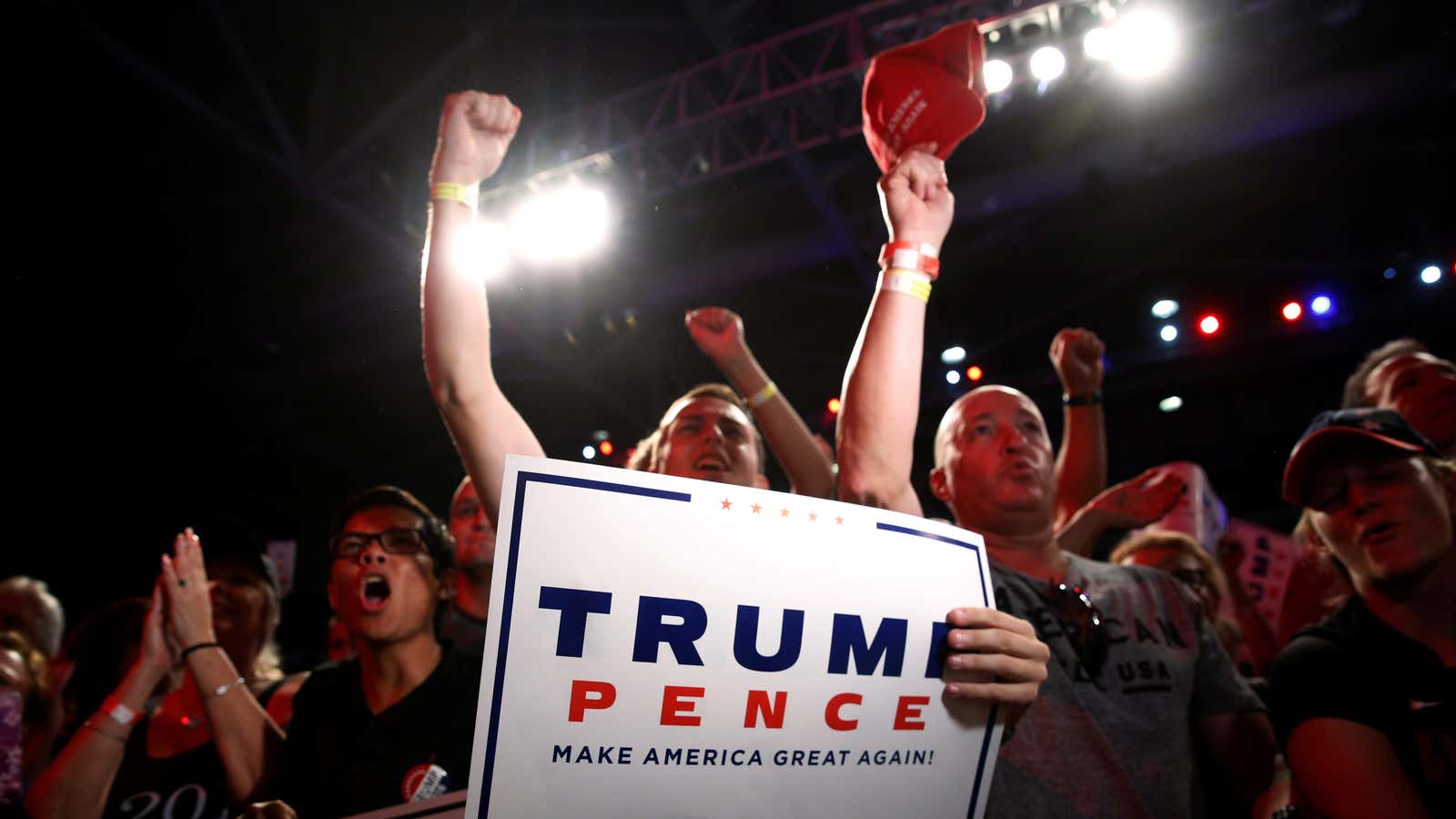Turn a word into a political epithet and soon enough it loses its capacity to help us understand a phenomenon that’s unfolding right before our very eyes. If you want to call Donald Trump a fascist, you grapple with the legacy of that word, which the extreme left made synonymous with right-wingers and punk rock equated with government itself.
That’s a shame because a German philosopher who died recently, Ernst Nolte, bequeathed to us a definition of fascism that explains a lot about the rise of Trump as the Republican standard-bearer. He’s not simply a right-winger or the government itself. But he deserves the label “fascist.”
Nolte defined fascism less as a set of ideologically coherent policies–if that doesn’t describe Trump, what does?–but as a form of resistance to modernization as it took shape in first decades of the 20th century. Seen in that light, Trump rides atop resistance to the American form of modernization a century later, one in which the country is more globalized in its economics and more diverse in its population with every passing day.
The Nolte concept knits together strands of a debate about the Trump phenomenon carried on by the likes of Josh Marshall at Talking Points Memo, Jamelle Bouie at Slate and new-media professor Clay Shirky. Along with researchers at Gallup, they’ve sorted through whether economics (middle-aged white guys whose jobs went overseas) or xenophobia (middle-aged white guys who have a grudge against people of color) explains Trump. Nolte’s concept leads us to a satisfying synthesis: both.
Fascism, Nolte wrote in his seminal 1963 book “Three Faces of Fascism” is defined by its “rejection of transcendence.”
Modernization, in the early 20th century, steadily though imperfectly liberated men, and to a lesser extent women, from traditional limitations imposed by class, religion or gender. Workers got unions, Jews got citizenship and women got to vote. Certain values, notably equality, were thought to transcend all groups. That was the legacy of the Enlightenment, the West’s intellectual awakening of the 18th century.
Whether in Germany, Italy or France, Nolte wrote, fascists had no truck with this progress. They were, in the words of a professor of mine, “at war with everything that had happened in the West since the Enlightenment.” Whatever progress accrued to their civilization, the fascists though it should not transcend the chosen group. A richer society was better. But not everyone had a claim on its fruits.
The debate over Trump boils down to two camps. One side looks at Trump’s rhetoric on international trade as evidence that he had reached economically distressed white males who suffered as jobs migrated abroad. The Wall Street Journal even cross-referenced the results of Republican primaries with counties most affected by competition from China, and found that Trump won 89 of 100 of them. Flanked by anecdotes from North Carolina’s furniture industry, which bore the brunt of Chinese competition in the past decade, it made for a nice story.
A massive study by Jonathan Rothwell at the Gallup polling organization rebuts this interpretation. Rothwell found that “living in areas more exposed to trade and immigration does not increase Trump support.” In fact, Trump supporters, though they tend to wear blue collars and have less education, have decent household incomes.
But Trump’s chosen group feels under siege, much like the fascist voters of the 1930s whose bête noire was modernization. Today’s globalization and immigration have become the trends that they fear, and Trump talks about both in racial tones. The trade deals he dislikes the most are with Latin and Asian nations. Trump’s rhetoric, in the words of Bouie at Slate, “attracts those who would like to see the old racial hierarchy restored,” Bouie wrote. Its appeal may have nothing to do with trade itself.
An America that must accommodate developments originating in the darker-skinned abroad, whether Shanghai or Mexico City, with more dark skin apparent than ever before, unsettles Trump voters. The America that was great, in their eyes, was mostly white, and the world adjusted to America, not the other way around. “The fact that what’s being lost is in most respects something that wasn’t legitimate to have in the first place – status, centrality and racial privilege – should not blind us to the fact that the loss is real and that it will have political consequences,” Marshall of Talking Points Memo wrote.
Explanations for Trump also have to grapple with his full-out embrace of the welfare state in the United States. Ever hear Trump excoriate Medicaid, or food stamps or unemployment insurance? Has the man who smashed through all sorts of campaign norms ever touched the infamous third rail of American politics, Social Security? Never. “We’re gonna save your Social Security without any cuts,” he said. “Mark my words.”
New-media guru and New York University professor Clay Shirky was channeling Nolte when he observed on Twitter that “Trump has promised 40% of the country what they’ve always wanted: a racist welfare state.” It was never the welfare state that is the problem for them; it was the beneficiaries. Trump has sought to legitimize white America’s claim on the resources of the state by denigrating the rest of America’s claim, especially if they have darker skin or came from another country.
Now, Trump is not Adolf Hitler, a uniquely evil person. But he’s a fascist because in Trumpworld, the benefits of today’s modern society would not flow beyond the chosen group, those “real Americans” who at one time made America great.” We may never know if Trump himself actually believes what he’s saying, if he’s capable of sincere belief at all. But his politics, Nolte might observe today, reject the transcendence embodied in the famous line of the Declaration of Independence that “all men are created equal.” That makes him America’s own fascist.
